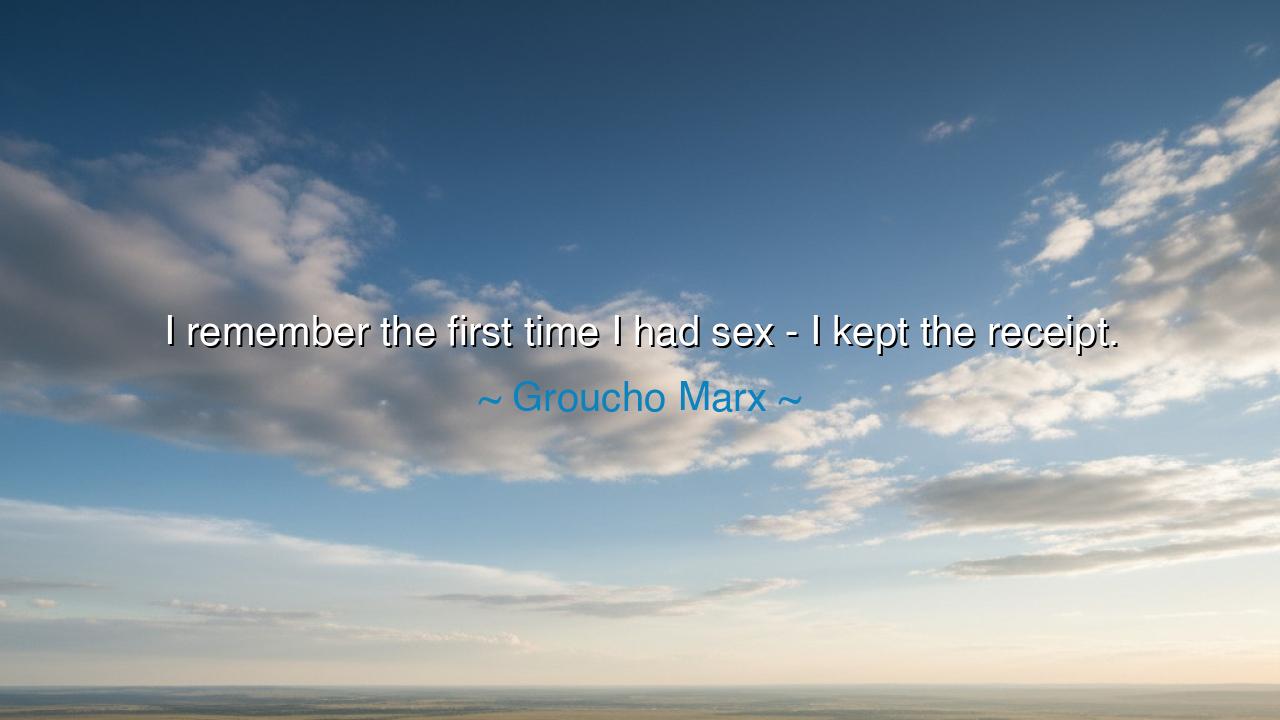
I remember the first time I had sex - I kept the receipt.






Groucho Marx, master of wit and satire, once loosed upon the world this quip: “I remember the first time I had sex – I kept the receipt.” At first glance, it is laughter that this line provokes, a jest woven from absurdity. Yet as with all true comedy, there is truth hidden within the laughter, truth that speaks to human longing, to insecurity, and to the way we use humor to veil the most vulnerable parts of our lives.
The meaning of Groucho’s words rests in exaggeration and irony. By speaking of intimacy as though it were a commercial transaction, a thing one could purchase and even demand a refund for, he ridicules the awkwardness and uncertainty of first experiences. The joke strikes at the heart of how we, as humans, often approach love and sex with both great seriousness and great insecurity. Groucho collapses this seriousness into the absurd image of a man clutching a receipt, as if to prove that his experience was real. Through humor, he reminds us not to take ourselves too gravely.
The origin of such a saying lies in the tradition of vaudeville, burlesque, and the quick wit of the Marx Brothers, who thrived in an era when comedy was both entertainment and cultural commentary. In an age still bound by propriety and social taboos, comedians like Groucho used sly innuendo to speak of subjects that otherwise could not be spoken of openly. By cloaking intimacy in the language of commerce, Groucho mocked not only human insecurity but also society’s attempts to make the natural seem shameful or awkward. His humor freed audiences to laugh at what they secretly feared or puzzled over.
History shows us that humor has long been the sword that pierces hypocrisy. Aristophanes, the ancient Greek playwright, once filled the stage with bawdy jokes and outrageous scenarios to expose the follies of war, politics, and desire. His comedies, like Groucho’s quip, invited people to laugh, but in laughing, they learned. The joke about the receipt is cut from the same cloth—it turns the profound into the ridiculous, and in so doing, helps us face truths we might otherwise shrink from.
The lesson in Groucho’s jest is subtle but powerful: learn to laugh at yourself, especially in moments of insecurity. Life’s firsts—whether in love, work, or adventure—are often awkward and uncertain. Fear and embarrassment may tempt us to hide, but humor turns shame into strength. When we laugh, we take back power from the things that trouble us. To “keep the receipt” is to acknowledge our nervousness and uncertainty, but also to embrace it with playfulness.
For you, listener, the practical wisdom is this: do not let life’s stumbles or embarrassments weigh upon your spirit. When you falter, find the humor. When you feel insecure, tell the story with a smile. Let laughter lighten the burden of imperfection, for no man or woman is without awkward moments. The ability to laugh at one’s self is not weakness but courage, a shield against despair and an invitation to resilience.
Thus, Groucho’s jest endures not merely as a bawdy line from an old comedian, but as a piece of timeless wisdom. “I kept the receipt” is not about sex alone—it is about how we face life’s anxieties. We can meet them with fear, or we can meet them with laughter. And if we choose laughter, then even our most uncertain steps become part of the great dance of joy.






AAdministratorAdministrator
Welcome, honored guests. Please leave a comment, we will respond soon